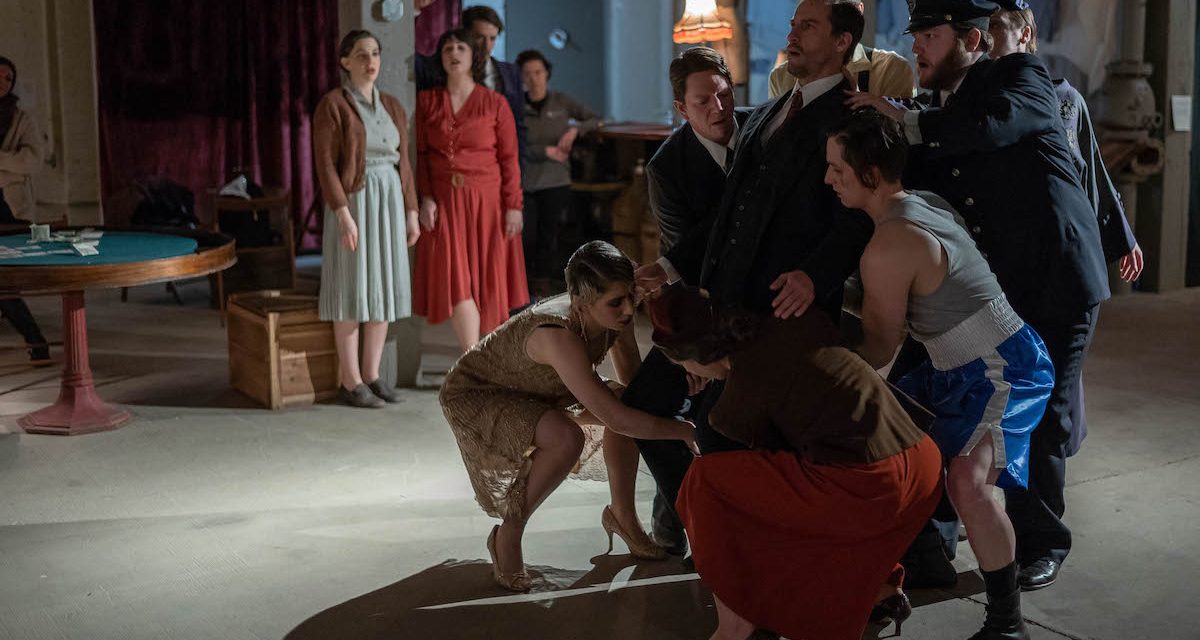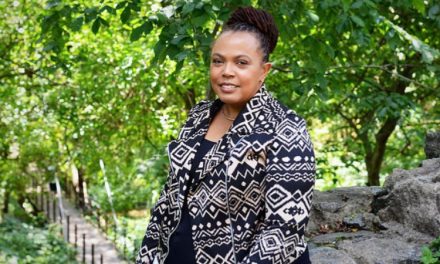“In a world of multiple and competing narratives, site-specific theater can allow audience members to have profoundly individual experiences when attending the theater. This has an understandable appeal, especially in a cultural climate that places a high value on experiences rather than material things.”
–Krysta Dennis, theater director and Siena College professor
It’s been going on for a few years and actually goes back thousands of years, but producing plays in buildings that are not theaters has picked up in the Capital Region in the last year and is creating some of the area’s most exciting and compelling dramatic art. Sometimes called site-specific theater, it is theater that is produced in any building or place (such as a forest’s edge) that is not designed to house theater. It can also transform the theater it is staged in to resemble the setting of the play, such as a junkyard or refugee camp. Occasionally, it may be an alternative space that doesn’t necessarily match the setting of the play, but provides a dramatic setting for the story.
The practice is sometimes called environmental or immersive theater, where the play takes place in a setting that lines up with the play’s context. There was a concert presentation of “Ragtime” at Ellis Island, the Tooting Arts Club built a pie shop at the off-Broadway Barrow Street Theatre off-Broadway, and there was a production this past spring in Ithaca at Bool’s Flower Shop of “Little Shop of Horrors.” A reading of “Fun Place is planned for Dec. 19 at the Plaza Jewish Community Chapel in New York, featuring an all-star cast including Will Swenson, Kate Baldwin and Jenn Colella.
Three groups dominate this practice in the Capital Region, but many more have tested the waters (and there are sure to be many more in the months to come). Creative License has used Albany Barn as its home theater and will again for its April production of “Stop Kiss.” They’ve also used the Frear Building in Troy for “Row After Row” and recently did a superb job with Krysta Dennis directing “Turn of the Screw” with Albany’s Ten Broeck Mansion standing in for the short story’s Bly House.
NorthEast Theatre Ensemble presented “The Women” at Steamer No. 10 Theatre, but since then have taken on a nomadic existence. Their exemplary work includes “A Streetcar Named Desire” at Albany Distilling Company, two years of a “Stockade Séance” at Hendrick Brouwer House in Schenectady’s Stockade district and “The Little Foxes” and “An Ideal Husband” at Ten Broeck Mansion.
Troy Foundry Theatre’s mission statement includes “devising and immersive performances.” In addition to a one-week run of their first production, “New World Order” at the Meader Little Theatre on the Sage Colleges Troy campus, they have performed at an office building near Franklin Plaza, Collar Works gallery and, most recently presented, “Yellow” at the long unused Trojan Hotel in Troy.
Many other groups, of course, have ventured into parks and historic sites to perform. These include Albany Civic Theatre doing a series of “Graveside Chats” at Albany Rural Cemetery, Black Theatre Troupe of Upstate NY, using the Stephen and Harriet Myers House in Arbor Hill and Will Kempe’s Players using a dozen different sites each season.
I’ve seen three different Dennis productions staged in the Ten Broeck Mansion, and each one has used the historic house differently. I asked her about what the literature gains from the architecture. “I love how a site, carefully explored, listened to, then utilized, becomes a character in its own right in site-specific theater,” she says. “When Ten Broeck Mansion ‘played’ Bly Manor in ‘The Turn of the Screw,’ it was a ‘house that hissed like snakes’ from the evils of its spectral inhabitants. When the Mansion ‘played’ the home of Sir Robert and Lady Gertrude Chiltern for ‘An Ideal Husband,’ the house bustled with life in Wilde’s world of wit and social class maneuvering.”
The surroundings do become characters in the way that traditional theaters in some ways insulate you. I remember distinctly the heat and the sounds of the neighborhood (a siren, a train passing) enhancing the “Streetcar” in North Albany. Troy Foundry Theatre has taken me to buildings that I’ve never seen before. Spaces not designed for theaters open audiences to the theater of the world. Play this game: Wander through your day and imagine what plays could take place in the spaces you pass through. What could be staged on the Plaza, under 787, in your favorite bar or café?
When off- and off-off-Broadway sprang up in the ’50s and ’60s, it was sometimes called coffeehouse theater because so many plays by Sam Shepard, John Guare and Lanford Wilson originated in bars and coffeehouses, notably Café Cino in Greenwich Village. Site-specific theater also is a matter of access. More than 60 groups produce theater in the Capital Region, but only a handful of theaters are available to rent. The site-specific movement in the Capital Region also reflects that more makers, ideas and ambitions exist here than space in which to hold them.
“The Capital Region is so rich in interesting places to make theater,” Dennis says. “It would seem a terrible shame to confine this ancient, malleable and ephemeral art form behind the proscenium.”





